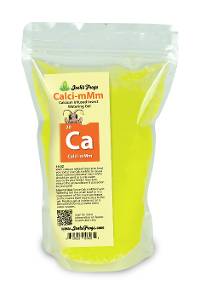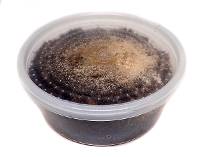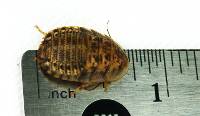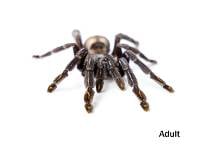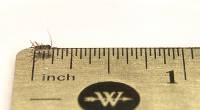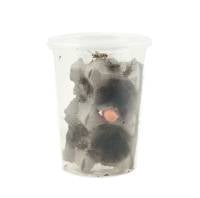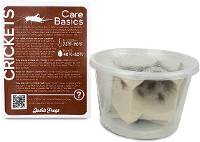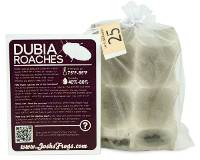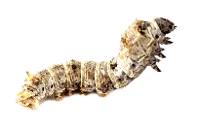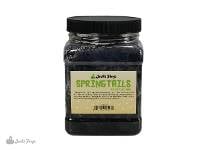Josh's Frogs
Why you should buy from us
Socotra Island Blue Baboon Tarantula - Monocentropus balfouri (Captive bred)
Socotra Island Blue Baboon Tarantula - Monocentropus balfouri (Captive bred)
$84.99 $99.990.0 out of 5 stars
(0)
0.0 out of 5 stars
(0)About This Product
SPECIAL NOTE: USPS forbids shipping venomous spiders or scorpions in the mail.
Because of this, we ship these animals FedEx priority overnight for a flat fee of $39.99.
Defining Characteristics:
- This species is one of the few theraphisids that the females have a strong maternal instinct. They not only protect their young, which are more than happy to stay in a colony with the mother, the mother M. balfouri will actually bring meals to her young.
- One of the few tarantula species observed in the wild to live communally, a family group of this species would be a fun undertaking for an experienced keeper.
- One of the best webbers in the tarantula family, these fossorial beauties will readily turn their enclosure into an elaborate maze of webs.
- An old world tarantula, this species is noted to have fairly strong venom and extra care should be taken to avoid bites. It is for this reason that we do not recommend these for inexperienced keepers.
Monocentropus balfouri or "Socotra Island Blue Baboon Tarantula" has a scientific name that broken down means "one central foot". If you look at the Greek and Latin roots of the genus name, its common name is much easier to decipher; they hail from Socotra Island, which is located Northeast off the coast of Somalia and they have wonderful navy blue coloration to their legs.
Enclosure size: These lovely spiders prefer to live most of their lives below ground. Babies usually like a good 3 inches of substrate to burrow in, while adults would be perfectly content with around 8 inches. Given less substrate they will web extensively, but may be more defensive. For floor space, 3-4 times the spider’s diagonal leg span in either direction is appropriate. Their prolific webbing habits do give a bit of padding against falls, but there should still be no more than 2 times the spider's diagonal leg span of "head space" above the substrate.
Want to spice up your enclosure with live plants? Our experts have curated kits of easy-to-care-for and SAFE plants for your tarantula. Check them out here!
Temperature (°F): A comfortable range for them is between 73-77°. Temperatures consistently under 60° or over 85° should be avoided for long term safety of the spider.
Humidity: 50%-60% is the ideal humidity range for this species. This can be easily achieved by keeping a portion of the substrate moist but not soaked. An occasional overflow of the water dish can help aid in moisture retention. Additional misting to maintain this may be necessary depending on your home climate or the season.
Size: At time of sale these spiders are at least 1.5 inches. As adults they range from 4-6 inches, and grow at a medium rate for tarantulas.
Josh's Frogs measures our tarantulas by diagonal leg span.
Age: At least 1 year at time of sale. This species has been documented to live 10-15+ years if females, while males average about a 3-4 year life span.
Feeding: At the time of sale these Monocentropus balfouri are eating ½” crickets, dubia roaches and waxworms weekly. As they grow, the size of prey can be increased as well, using the size of the spider's carapace (hard upper 'shell' of the cephalothorax, a.k.a. the front part of the spider) as a guide. A good snack for this tarantula would be a hornworm of appropriate size, but not as a staple diet.
Sexing: Due to age, Monocentropus balfouri sold by Josh's Frogs are unsexed. As they approach maturity, specimens may be sexed using a molt. Females will have spermatheca and a uterus externus between the top set of book lungs that will catch and "flap" if a pin is run down the inside of the abdomen. Males will have a much more plain slit that does not budge with attempts to manipulate it.
Coloration/Patterning: Babies are an almost steel gray color with dark legs. As they age, this turns into a more creamy greige base coloration with dark blue legs.
Social Behavior: Monocentropus balfouri can be kept communally under certain circumstances. Success in keeping this species together requires research, the correct habitat, and at least 4-5 individuals. This species can be kept alone and that is the safest way to keep them.
Breeding: It is usually recommended that spiders for breeding purposes should remain supervised when together and should only be attempted well fed. Mature males can be put in the enclosure of a mature female for courtship/mating. Remove male promptly after insertion is observed, or immediately if female is less than receptive. This is best done around a month after the female molts, as a freshly molted female is less likely to molt out of a pairing. Due to the communal nature of this species, breeding is a bit more lax and while it is still a good idea to supervise courtship, it is also ok to cohabitate using your best judgment as to the pair's response towards each other.
Natural Range: Monocentropus balfouri are found on the island of Socotra, which is located Northeast off the coast of Somalia, and South of Yemen, its mother country.
Links of Interest:
- Arachnoboards: a community of spider enthusiasts that will be able to or have already answered almost any question you can think of with regards to tarantulas.
Still not sure if Socotra Island Blue Baboon tarantula from Josh's Frogs is the right pet bug for you? Read the reviews below and see what other customers are saying!
Shipping
After placing an order containing a live animal, you will receive a scheduling email containing our JotForm scheduling link to schedule your new pet's delivery date.
With this scheduling link, you will be able to schedule your order's delivery up to 30 days in advance. You will be able to choose a date of delivery for Tuesday-Saturday (Saturday arrival depends on the carrier's service availability) with the estimated time of arrival generally being 12pm, or 4:30pm for more rural areas. Overnight lows must be above 40°F to ship directly to you (or above 30°F for FedEx Ship Center pickups) as well as below 90°F by estimated time of arrival.
If you require further assistance, or prefer to talk to one of our Customer Service agents, please feel free to reach out to our [email protected] email or our phone line 1-800-691-8178.
Other Customers Also Bought
Customer Reviews
0.0 out of 5 stars
Review data
5 star reviews
- 0%
4 star reviews
- 0%
3 star reviews
- 0%
2 star reviews
- 0%
1 star reviews
- 0%


